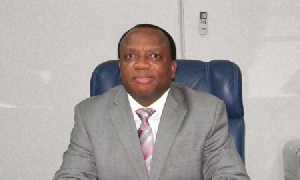 Mr Millison Narh, First Deputy Governor of BoG
Mr Millison Narh, First Deputy Governor of BoG
Mr Millison Narh, the First Deputy Governor of the Bank of Ghana, has called for awareness creation among Bank Executives on mobile money transfer to move the policy forward.
He said some Bank Executives are not cooperating because of lack of education and awareness.
Mr Narh, speaking at the launch of Ghana Digital Financial Services programme in Accra, expressed the need for stakeholders to collectively support the project.
The five-year programme is to improve financial inclusion of Ghana’s population by increasing access to low cost financial services.
The Consultative Group to Assist the Poor (CGAP) and the International Finance Corporation (IFC) collaborated to design and execute the programme with a sponsorship from Switzerland.
Mr Narh said globally, financial inclusion has been identified as critical to achieving inclusive growth, and also a prerequisite for promoting sustainable economic growth and development and thanked the development partners for their continuous support for Ghana to promote a financially inclusive society.
He said the 2015 Global Index Survey revealed that Ghana has made significant progress in promoting financial inclusion since the previous survey.
“The proportion of adult population using formal financial services rose from 29.4 per cent in 2011 to 40.5 per cent in 2014.
“As you may well know, within the intervening period of the two surveys, the Bank intervened with some policy responses to enhance financial inclusion,” he said.
Notably among those policy actions, he said, are the a new National Payment Systems Strategy, which seeks to promote both the use of electronic payments over cash, and financial inclusion; and Electronic Money Issuers and Agent Guidelines to promote safe and secure issuance and acceptance of digital money as a means of promoting financial inclusion.
Mr Narh said the signalling effect of these two policy actions of the Bank has resulted in marked increases in mobile money transactions within the past three years.
He announced that the amount of mobile money float balances with partner banks is GH? 223.3 million in 2014 compared with GH? 547.9 million in December 2015.
He said the outlook for the mobile money industry is positive evidenced by increased number of partnership being formed by mobile money operators and regulated financial institutions to deploy innovative financial services targeting the needs of the financially excluded.
The First Deputy Governor, therefore, expressed the hope that the launch of the programme would provide the sustained efforts required to promote inclusive finance by identifying and removing constraints relating to policy, product design and implementation, and customer resistance to digital finance among others.
Mr Ivo Germann, Head of Operations SECO, Economic Cooperation and Development, said mobile financial services programmes have proven to be an effective tool to promote financial inclusion, because it is cost effective, and allows for scale by building on existing platforms even in poor and remote areas.
He said mobile financial services already exist in Ghana, and the country presents the opportunity due to its market structures, regulatory environment and the political will.